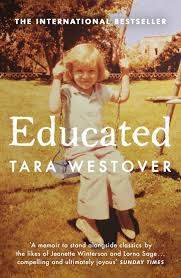
Tara Westover has an upbringing ideal for the dinner party anecdote. Her family are Mormons so Mormon that other Mormons think they have gone off the edge. The first very dubious sign is when the father decides, based on a line in Isaiah, that milk is evil, so they all have to eat their cereal with molasses. It’s all downhill from there. He gradually pulls the children out of school, till by the time it is Tara’s turn (she is the youngest) she doesn’t get to go at all, and her ‘homeschooling’ curriculum is 100% to do with how to work in a scrapyard without safety equipment. Her father does not believe they need safety equipment, because they are under the Lord’s protection. The same logic apparently holds after a major car accident, in which her mother incurs what appears to be brain damage. She is treated not at a hospital but in their own basement, where the medicine is lying in the dark. Eventually she emerges, allegedly not that much different, except for the occasional inability to tell her children apart.
One of Tara’s older siblings decides he wants to go to high school, and is allowed to enroll and eventually goes to University. Tara is inspired also, and while she does not go to school, she teaches herself enough to get into the big Mormon school, Brigham Young. This is a bigger achievement than it sounds; though she can read, she has had little access to books other than nineteenth century Mormon prophecy. Scale of her ignorance is shown by the fact that she has never heard of the Holocaust before it comes up in Art History class. From here the book follows the classic arc of the poor kid makes good, with Tara going on to Cambridge and to Harvard.
Oddly however, interesting as the above triumph-over-unusual-personal-circumstance was, what was more interesting to me was Tara’s struggle with whether or not she even wanted to triumph. While her parents don’t object to her going to school, and even are proud of her for it, they don’t actually want her to learn anything there. Or get vaccinated, for example; or wear a tank top; or question whether or not her brother should beat his wife. The relationship with her family eventually breaks down, and her father sincerely offers her a way back in if only she will agree with everything he thinks. Tara has to make a terrible decision between her own mind and her family. She choose her mind.
For me, this is clearly a mistake. Just lie! But somehow she feels she can’t do that; and so the book is rather bittersweet, and I think therein lies its power. It’s a bestseller, which I think is partly down to the fun of rubbernecking survivalists (who can resist?) but in larger part down to its odd divided nature, as an elegy to something the author is glad to have lost.
